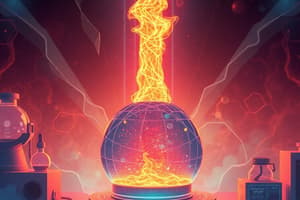Podcast
Questions and Answers
What is the relationship that thermochemistry deals with?
What is the relationship that thermochemistry deals with?
- The relationship between chemical composition and enthalpy
- The relationship between temperature and pressure
- The relationship between chemical composition and pressure
- The relationship between chemical composition, temperature, and energy (correct)
How is heat capacity usually expressed?
How is heat capacity usually expressed?
- Kilograms per degree Celsius (kg/°C) or kilograms per mole-kelvin (kg/mol·K)
- Kilograms per gram per degree Celsius (kg/g°C) or joules per mole-kelvin (J/mol·K)
- Joules per degree Celsius (J/°C) or joules per mole-kelvin (J/mol·K) (correct)
- Joules per gram per degree Celsius (J/g°C) or joules per mole per degree Celsius (J/mol°C)
What does specific heat capacity measure?
What does specific heat capacity measure?
- The amount of enthalpy change in a chemical reaction
- The maximum reversible work that can be done by a system at constant temperature and pressure
- The amount of heat energy required to raise the temperature of a unit mass of a substance by a certain amount (correct)
- The amount of heat energy required to raise the temperature of a system by a certain amount
What is enthalpy's relationship to a chemical reaction?
What is enthalpy's relationship to a chemical reaction?
What does heat capacity of a substance depend on?
What does heat capacity of a substance depend on?
What is the standard enthalpy of formation?
What is the standard enthalpy of formation?
What is the purpose of calorimetry?
What is the purpose of calorimetry?
Why do endothermic reactions require energy to occur?
Why do endothermic reactions require energy to occur?
What kind of reactions result in an increase in the temperature of the system?
What kind of reactions result in an increase in the temperature of the system?
What thermodynamic properties can be determined using calorimetry?
What thermodynamic properties can be determined using calorimetry?
Flashcards are hidden until you start studying
Study Notes
Thermochemistry
Thermochemistry is a branch of chemistry that deals with the relationship between chemical composition, temperature, and energy. It examines the changes in energy and temperature that occur during chemical reactions and processes. Key concepts in thermochemistry include heat capacity, enthalpy, calorimetry, and endothermic reactions.
Heat Capacity
Heat capacity is the amount of heat energy required to raise the temperature of a substance or system by a certain amount. It is usually expressed in joules per degree Celsius (J/°C) or joules per mole-kelvin (J/mol·K). The heat capacity of a substance depends on its chemical composition, molecular structure, and the temperature range being considered.
Specific Heat Capacity
Specific heat capacity is the amount of heat energy required to raise the temperature of a unit mass of a substance by a certain amount. It is usually expressed in joules per gram per degree Celsius (J/g°C) or joules per mole per degree Celsius (J/mol°C). The specific heat capacity of a substance is determined by its molecular structure and the energy required to increase its temperature.
Enthalpy
Enthalpy is the thermodynamic potential that measures the maximum reversible work that can be done by a system at constant temperature and pressure. It is the difference between the enthalpy of the products and the enthalpy of the reactants in a chemical reaction. Enthalpy is usually expressed in joules (J).
Standard Enthalpy of Formation
The standard enthalpy of formation is the enthalpy change that occurs when one mole of a substance is formed from its elements in their standard states. It is the enthalpy change associated with the formation of a substance from its constituent elements.
Calorimetry
Calorimetry is the experimental technique used to measure heat energy changes during chemical reactions or processes. It involves the use of calorimeters, which are devices designed to measure the amount of heat energy absorbed or released by a substance during a reaction or process. Calorimetry is used to determine the heat capacity, enthalpy, and other thermodynamic properties of substances.
Endothermic Reactions
Endothermic reactions are chemical reactions that absorb heat energy from their surroundings. They require energy to occur and result in an increase in the temperature of the system. Examples of endothermic reactions include combustion reactions and the dissociation of bonds.
In summary, thermochemistry is a crucial field that helps us understand the energy changes that occur during chemical reactions and processes. By studying heat capacity, enthalpy, calorimetry, and endothermic reactions, we can gain valuable insights into the properties and behavior of substances and the potential for energy production and storage.
Studying That Suits You
Use AI to generate personalized quizzes and flashcards to suit your learning preferences.


